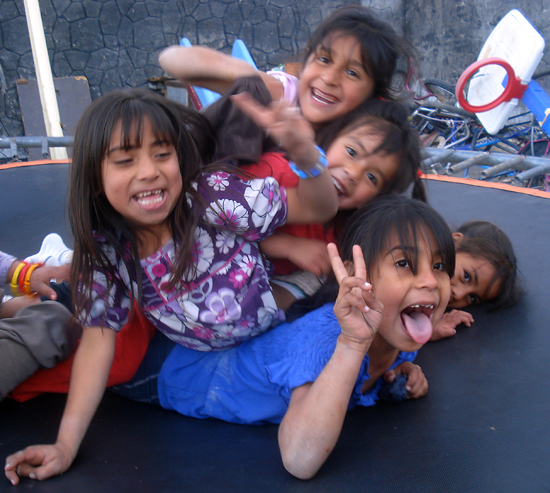Nearly a hundred children of all ages screamed “UCLA! UCLA!” as they gathered around the vans transporting student volunteers to an orphanage in Tijuana.
The children reside in a run-down site with water damage and mold and look forward to a day filled with arts, crafts and playing games. Since the rent is cheap and the managers of the orphanage are planning to fix the site up, the children have to endure the harsh conditions while they await the reconstruction of their new home.
However, because of the increase in violence as a result of the drug wars in Mexico, BruinHope volunteers are unable to obtain permission to use the vans provided by UCLA to go to Tijuana as a UCLA student organization.
BruinHope is sponsored by the Community Service Commission and applies for funds to provide supplies for the children and vans to transport them to and from Tijuana.
“Our vans are pretty much (the volunteers’) lifeline to get to Tijuana. They get the proper insurance and coverage, and we provide the transportation,” said Farhan Banani, Community Service commissioner and fourth-year economics student.
BruinHope travels to orphanage La Tribu de Jesus in Tijuana that holds nearly 100 children, ranging from newborns to children 17 years of age.
According to BruinHope director Meredith Pierce, this is the first quarter that BruinHope cannot go to Tijuana as a school-sponsored trip because of liability concerns.
Despite this hurdle, a number of BruinHope volunteers traveled to Tijuana on Saturday to see the children. Because they could not get sponsored by the school for this particular trip, they were unable to use university funding for kids’ activities and food, Pierce added.
“We are going on our own time, using our own money and our own cars. As long as we know where we are going and we know our way around, we haven’t had any trouble,” said Krystal De La Rosa, BruinHope director.
BruinHope engages in a number of safety measures to ensure the well-being of their volunteers when traveling to Tijuana.
“We just drive straight to the site and straight back to the border. We don’t stop anywhere. We don’t drive at night. We have walkie-talkies to keep in touch with one another,” Pierce, a fifth-year political science student, said.
On Saturday, volunteers rode in “beat-up” cars to blend in with the environment of Tijuana, Pierce said. Volunteers arrive to Tijuana around noon and leave right before it gets dark.
The drug wars have also had a direct impact on the children in the orphanages, De La Rosa, fifth-year biology student said. Many of the parents of the orphans are involved with the drug cartels or have died because of drug use. As a result of the violence in Tijuana, many Americans are more apprehensive about going to Mexico to offer help to the needy, De La Rosa said.
Volunteers also organize fundraisers and accept donations to take to the children. Since the volunteers are unsure when they will be able to go back as a student group, BruinHope plans to focus their efforts on collaborating with other groups within the university and in the greater Los Angeles area that are willing to offer help.
The group hopes to work with organizations like Habitat for Humanity to help with the reconstruction of the site the children live in, Pierce said. BruinHope also aims to spread awareness about the poverty in Tijuana to the UCLA community, Pierce added.
Images of the volunteers working with children in the orphanage will be featured at an art gallery during Week 9, held in the Kerckhoff Art Gallery called “Tijuana’s Children: Expressions Through Art.”
“Tijuana is so close to us and there is so much we can do to help the people there,” De La Rosa said. “It’s really important to the kids to just have someone to hold on to them or hold their hand as they walk.”
